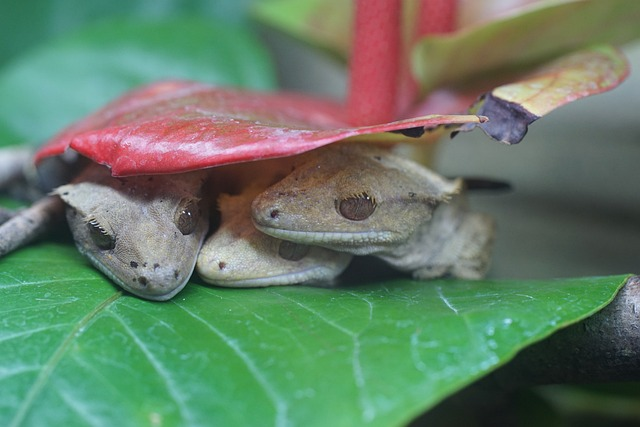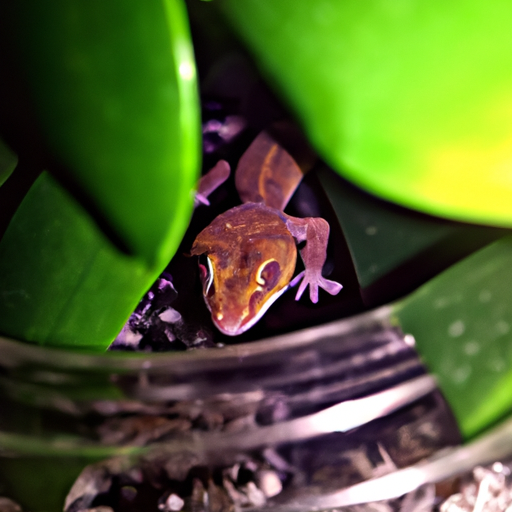
In “Choosing The Right Pet Gecko: Lifespan Factors,” this article provides valuable insights into the essential factors to consider when selecting a pet gecko. Understanding the lifespan factors is crucial in ensuring a healthy and fulfilling life for your gecko companion. By exploring various aspects such as species, habitat, and care requirements, you can make an informed decision and create a suitable environment that maximizes your gecko’s lifespan. Whether you are a seasoned gecko owner or a first-time reptile enthusiast, this article will guide you in making the right choice for your pet gecko.

1. Gecko Lifespan Overview
Factors that influence gecko lifespan
The lifespan of a gecko can vary depending on several factors. These factors include habitat and environment, diet and nutrition, health and genetics, stress and handling, and proper care and maintenance. Each of these factors plays a significant role in determining the lifespan of a gecko. By understanding and considering these factors, you can ensure that you are providing the best possible care for your pet gecko and maximizing its lifespan.
Average lifespan of different gecko species
Different gecko species have varying average lifespans. It is important to be aware of the lifespan of the species you are interested in before bringing one home as a pet. Some gecko species can live for several decades, while others have shorter lifespans. The average lifespan of geckos can range from 10 to 25 years, with some species living even longer under optimal conditions. It is essential to do thorough research on the specific species you are considering to ensure you are prepared for the commitment and responsibility of caring for a gecko throughout its lifespan.
2. Considerations for Gecko Lifespan
1. Habitat and Environment
Creating a suitable habitat and environment is crucial for the overall well-being and longevity of your gecko. Geckos require specific temperature and humidity levels to thrive. It is essential to provide a temperature gradient within the enclosure, allowing the gecko to regulate its body temperature effectively. Humidity should also be maintained at appropriate levels, mimicking the natural conditions of the gecko’s native habitat. Providing a spacious and appropriately sized enclosure with hiding spots and climbing structures will also contribute to the overall health and happiness of your gecko.
2. Diet and Nutrition
Proper diet and nutrition are vital for maintaining the health and longevity of your gecko. Geckos are insectivores, and their diet primarily consists of live insects. It is essential to provide a varied diet, including a variety of insects, to ensure they receive all the necessary nutrients. Feeding schedules may vary depending on the species, but it is generally recommended to feed adult geckos a few times a week. It is also crucial to ensure gut-loaded insects and proper supplementation are provided to meet the gecko’s nutritional needs. Water should be readily available and provided in shallow dishes or through misting.
3. Health and Genetics
Regular veterinary check-ups are essential for maintaining the health of your gecko. A veterinarian experienced in reptile care can monitor your gecko’s overall health, perform routine examinations, and address any potential health issues proactively. Geckos are susceptible to various health problems, including metabolic bone disease, respiratory infections, and parasitic infestations. By addressing health issues promptly, you can help improve your gecko’s lifespan. It is also crucial to select geckos from reputable breeders, as healthy genetics play a significant role in determining an individual gecko’s lifespan.
4. Stress and Handling
Minimizing stress and handling your gecko properly is essential for its well-being and longevity. Geckos are generally more solitary creatures and can become stressed by excessive handling or improper handling techniques. It is important to give your gecko time to acclimate to its new environment and provide hiding spots and climbing spaces within the enclosure. When handling your gecko, it is important to use gentle and proper techniques to avoid causing stress or injury. Limit handling to short periods and be observant of your gecko’s behavior to ensure it remains comfortable and stress-free.
5. Proper Care and Maintenance
Providing proper care and maintenance for your gecko is crucial for its overall health and lifespan. Regular cleaning and maintenance of the enclosure will prevent the buildup of harmful bacteria and ensure a clean and hygienic environment for your gecko. Monitoring and maintaining ideal temperature and humidity levels will further contribute to your gecko’s well-being. It is also important to monitor your gecko for any signs of illness or distress and take action promptly if any issues arise. Ensuring a safe and escape-proof enclosure will help prevent accidents and injuries that can shorten your gecko’s lifespan.
3. Habitat and Environment
1. Temperature and Humidity
Maintaining proper temperature and humidity levels is crucial for the health and longevity of your gecko. Different gecko species have specific temperature requirements, and it is important to provide a temperature gradient within the enclosure to allow your gecko to regulate its body temperature effectively. Using heat lamps, heating pads, or ceramic heat emitters can help maintain the appropriate temperature. Additionally, monitoring and adjusting humidity levels to mimic the natural conditions of the gecko’s native habitat is essential. This can be achieved by misting the enclosure or using a humidity gauge.
2. Size and Type of Enclosure
The size and type of enclosure you provide for your gecko can significantly impact its overall well-being. Geckos require adequate space to move around, climb, and hide comfortably. It is important to research the specific species you are caring for to determine the appropriate size of the enclosure. A general guideline is to provide a tank that is at least 20 gallons for a single gecko, with larger tanks recommended for larger species or multiple geckos. The type of enclosure, such as a glass tank or a screen cage, should be suitable for maintaining the required temperature and humidity levels.
3. Lighting and UVB Exposure
Lighting and UVB exposure are crucial for gecko health and longevity. Geckos require access to appropriate lighting, including UVB lighting, to meet their physiological needs. UVB lighting helps the gecko synthesize vitamin D3, which is necessary for proper calcium absorption and bone health. Regular exposure to UVB light sources, such as specific reptile UVB bulbs, will contribute to the overall well-being of your gecko. It is important to ensure the UVB lighting is placed at an appropriate distance from the gecko and replaced regularly as recommended by the manufacturer.
4. Substrate and Decorations
Choosing the right substrate and decorations for your gecko’s enclosure is important for maintaining a suitable environment. The substrate should be safe and non-toxic, allowing for easy cleaning and preventing the risk of impaction if ingested. Options such as reptile carpet, paper towels, or non-adhesive shelf liner are commonly used for gecko enclosures. Providing hiding spots, climbing structures, and foliage within the enclosure will create a stimulating and enriching environment for your gecko. Ensure the decorations are securely placed to prevent them from falling and potentially injuring your gecko.
4. Diet and Nutrition
1. Feeding Schedule
Establishing a proper feeding schedule is important for the health and longevity of your gecko. The frequency of feedings may vary depending on the species and age of your gecko. Generally, adult geckos are fed a few times a week, while younger geckos require more frequent feeding. It is important to observe your gecko’s feeding habits and adjust the schedule accordingly. Feeding at consistent times and monitoring their appetite will help ensure your gecko is receiving proper nutrition.
2. Types of Food
Geckos are insectivores and require a diet primarily consisting of live insects. Providing a variety of insects, such as crickets, mealworms, waxworms, and roaches, will help ensure your gecko receives a balanced diet. It is essential to gut-load the insects by feeding them with nutritious foods before offering them to your gecko. This ensures that the insects are a good source of nutrition for your pet. Additionally, dusting the insects with calcium and vitamin supplements helps meet your gecko’s dietary requirements.
3. Supplementation and Gut Loading
Supplementation and gut loading are important aspects of gecko nutrition. By gut loading the insects, you are providing additional nutrients that will then be passed on to your gecko when they consume the insects. This can be achieved by feeding the insects with high-quality fruits, vegetables, and commercial insect gut-loading diets. Additionally, dusting the insects with calcium and vitamin supplements before offering them to your gecko helps ensure they receive all the necessary nutrients. It is important to follow the recommended supplementation guidelines for your specific gecko species.
4. Water Source
Providing a clean and accessible water source is crucial for maintaining your gecko’s hydration. Geckos may obtain water through licking water droplets or by drinking from shallow dishes. It is important to regularly replace the water and keep it clean to prevent the growth of bacteria. In some cases, misting the enclosure can help provide humidity as well as a source of drinking water for your gecko. It is important to observe your gecko’s behavior and ensure it has access to water at all times.

5. Health and Genetics
1. Regular Veterinary Check-ups
Regular veterinary check-ups are essential for maintaining your gecko’s overall health and detecting any potential health issues early on. A veterinarian experienced in reptile care can perform routine examinations, provide vaccinations if necessary, and address any concerns you may have. Regular check-ups can help ensure your gecko’s health is consistently monitored and any potential issues are addressed promptly.
2. Common Health Issues in Geckos
Geckos are prone to certain health issues that can affect their lifespan. Metabolic bone disease, respiratory infections, and parasitic infestations are some of the common health problems seen in geckos. Metabolic bone disease is caused by a lack of proper calcium and vitamin D3, leading to weakened bones. Respiratory infections can occur due to poor husbandry practices or exposure to unclean environments. Parasitic infestations, such as mites or worms, can cause various health problems if not addressed. Being aware of these common health issues and staying vigilant for any signs or symptoms is important for ensuring the well-being of your gecko.
3. Avoiding Inbreeding
Inbreeding can negatively impact the health and lifespan of geckos. It is important to avoid inbreeding by acquiring geckos from reputable sources and breeders. Inbreeding can lead to genetic defects and susceptibility to various health issues. By selecting geckos that come from healthy and diverse genetic backgrounds, you can help ensure the long-term health and vitality of your gecko.
4. Choosing Healthy Gecko Offspring
If you decide to breed geckos, it is crucial to choose healthy gecko offspring. Selecting offspring that demonstrate good overall health and vitality can help maximize their lifespan. Carefully observing the behavior, physical appearance, and activity level of the offspring can aid in selecting healthy individuals. It is also important to ensure proper care and nutrition for the offspring to promote their well-being as they mature.
6. Stress and Handling
1. Minimizing Stressors
Minimizing stressors is essential for the well-being and longevity of your gecko. Geckos can become stressed by various factors, such as loud noises, excessive handling, or sudden changes in their environment. It is important to provide a quiet and calm environment for your gecko, free from excessive noise or disturbances. Additionally, avoid handling your gecko excessively or roughly, as this can cause stress. Minimize any abrupt changes in the enclosure or its surroundings to help keep your gecko comfortable and stress-free.
2. Proper Handling Techniques
Proper handling techniques are crucial for minimizing stress and potential injury to your gecko. When handling your gecko, it is important to be gentle and avoid gripping or squeezing it tightly. Supporting the gecko’s body and allowing it to move freely can help prevent stress and injury. It is also important to wash your hands before and after handling to maintain cleanliness and prevent the transmission of any potential pathogens.
3. Providing Hiding and Climbing Spaces
Geckos are naturally inclined to climb and hide, and providing suitable spaces for these activities can contribute to their overall well-being. The enclosure should include various hiding spots, such as caves or artificial plants, where your gecko can retreat to when it feels threatened or stressed. Climbing structures, such as branches or rocks, can also provide exercise and mental stimulation for your gecko. These spaces not only help reduce stress but also mimic the gecko’s natural habitat, promoting their overall health and longevity.

7. Proper Care and Maintenance
1. Regular Cleaning and Maintenance
Regular cleaning and maintenance of the gecko’s enclosure is essential for preventing the buildup of harmful bacteria and maintaining a clean and hygienic environment. Regularly remove any feces, shed skin, or uneaten food from the enclosure. Clean and disinfect the enclosure and its accessories as necessary, ensuring that any cleaning products used are safe for reptiles. Regular cleaning and maintenance routines will help create a healthy and comfortable living space for your gecko.
2. Maintaining Ideal Temperature and Humidity
Maintaining ideal temperature and humidity levels is crucial for the well-being of your gecko. Regularly monitor and adjust the temperature and humidity within the enclosure to ensure it falls within the recommended range for your gecko species. This may involve using heat lamps, heating pads, foggers, or misting systems to achieve the desired conditions. Regularly check and calibrate any temperature and humidity monitoring devices to ensure accurate readings.
3. Monitoring for Signs of Illness
It is important to monitor your gecko for any signs of illness or distress. Common signs of illness in geckos include changes in appetite, weight loss, lethargy, abnormal stool, respiratory issues, or visible signs of injury or infection. Regularly observe your gecko’s behavior, eating habits, and physical appearance to help detect any potential health issues early on. Any concerns should be promptly addressed by a veterinarian experienced in reptile care.
4. Ensuring a Safe and Escape-Proof Enclosure
Creating a safe and escape-proof enclosure is essential for the safety and well-being of your gecko. Ensure that the enclosure is securely closed and that there are no gaps or openings that your gecko can escape through. Regularly check the enclosure for any potential hazards, such as loose wires or objects that could pose a danger to your gecko. Providing a safe environment will minimize the risk of accidents or injuries that could impact your gecko’s lifespan.
8. Gecko Species with Long Lifespans
1. Leopard Geckos
Leopard geckos (Eublepharis macularius) are among the most popular pet gecko species and have a relatively long lifespan compared to other gecko species. With proper care, leopard geckos can live up to 20 years or more. They are relatively easy to care for, have docile temperaments, and come in a variety of colors and patterns.
2. Crested Geckos
Crested geckos (Correlophus ciliatus) are another popular pet gecko species known for their long lifespans. With proper care, crested geckos can live up to 20 years or more. They are arboreal geckos with unique crests on their heads and have become increasingly popular due to their ease of care and availability in the pet trade.
3. Gargoyle Geckos
Gargoyle geckos (Rhacodactylus auriculatus) are visually striking geckos known for their unique appearance and long lifespans. With proper care, gargoyle geckos can live up to 20 years or more. They have a docile temperament and are generally easier to handle compared to some other gecko species.
4. African Fat-Tailed Geckos
African fat-tailed geckos (Hemitheconyx caudicinctus) are relatively small geckos known for their fat tail and long lifespans. With proper care, African fat-tailed geckos can live up to 20 years or more. They have similar care requirements to leopard geckos and are suitable for beginner reptile keepers.
5. Day Geckos
Certain species of day geckos (Phelsuma spp.) have relatively long lifespans compared to other gecko species. With proper care, day geckos can live up to 10 to 15 years or more. They are known for their vibrant colors, active behavior, and high energy levels. Day geckos require specialized care due to their specific environmental and dietary needs.

9. Gecko Species with Shorter Lifespans
1. Tokay Geckos
Tokay geckos (Gekko gecko) are known for their aggressive temperament and shorter lifespans compared to some other gecko species. With proper care, they can live up to 10 to 15 years. Tokay geckos require experienced handlers and specialized care due to their aggressive behavior and specific environmental requirements.
2. House Geckos
House geckos (Hemidactylus spp.) are widespread geckos commonly found around human habitation. They have relatively shorter lifespans, averaging around 5 to 10 years. House geckos adapt well to captive environments but may require additional care to meet their specific dietary and environmental needs.
3. Mediterranean Geckos
Mediterranean geckos (Hemidactylus turcicus) are small geckos commonly found in Mediterranean regions. They have relatively shorter lifespans, averaging around 3 to 8 years. Mediterranean geckos are relatively easy to care for and adapt well to captive environments, but their lifespan tends to be shorter compared to some other gecko species.
4. Ground Geckos
Certain species of ground geckos (e.g., Teratoscincus sp.) have shorter lifespans compared to other gecko species. Ground geckos are adapted to desert environments and have specific care requirements. With proper care, ground geckos can live up to 5 to 10 years. It is important to research the specific species’ needs before considering them as pets.
10. Conclusion
Understanding and considering the factors that influence gecko lifespan are crucial when choosing the right pet gecko. Factors such as habitat and environment, diet and nutrition, health and genetics, stress and handling, and proper care and maintenance play significant roles in determining the lifespan of a gecko. By providing suitable habitat and environment, following proper diet and nutrition guidelines, ensuring regular veterinary care, minimizing stress, and providing proper care and maintenance, you can contribute to the well-being and longevity of your pet gecko. Proper care, nutrition, and genetics are key components in maximizing the lifespan of your gecko and enjoying many years together.
